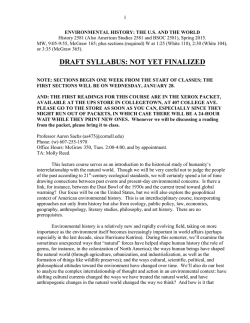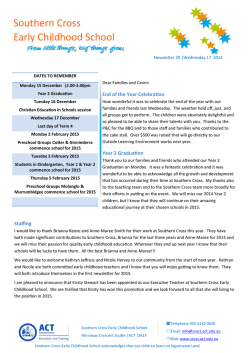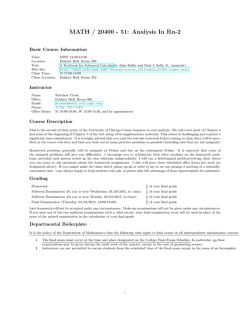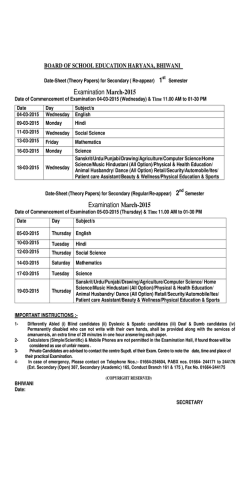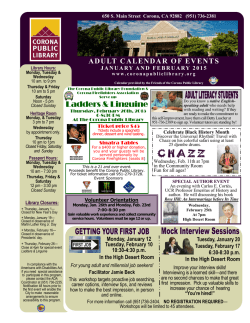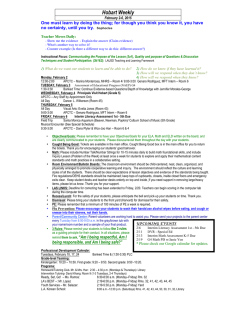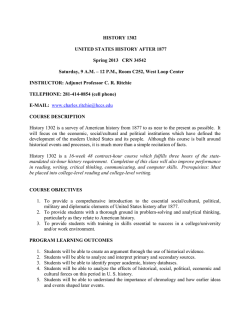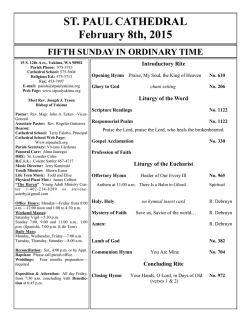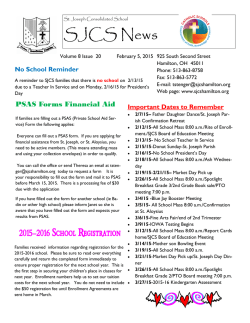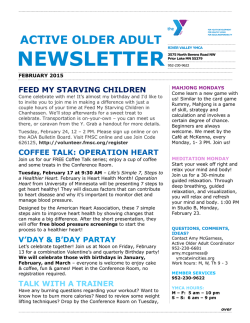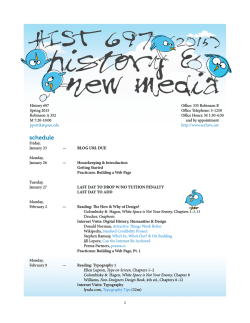
HIST 2301 (History of the United States Since 1877)
1 HIST 2301: History of the United States Since 1877 Fall 2007 - (Section 160): MW 1:00 – 1:50 – (104 Holden Hall) Professor (contact information): Dr. Sean P. Cunningham Email: [email protected] Office: 147 Holden Hall (2-1004, ext. 260) Office Hours: MW: 2:00-3:00, F: 1:00-2:00 Teaching Assistants: Krystal Humphreys – Discussion Sections (710 – W8, 760 – M2, 780 – F2, 810 – F3) James Jones – Discussion Sections (740 – W12, 770 – W2, 790 – M3, 800 – W3) Ana Satterfield – Discussion Sections (700 – M8, 720 – F8, 730 – M12, 750 – F12) Course Description and Purpose ¾ This course provides an overview of United States history since 1877 and will cover various themes in social, cultural, political, military, and diplomatic history. The course satisfies 3 hours of the state of Texas legislative / core curriculum requirement in US history. Required Texts: ¾ ¾ ¾ ¾ Cobbs Hoffman, Gjerde, ed., Major Problems in American History, Volume II: Since 1865. Kevin Boyle, Arc of Justice: A Saga of Race, Civil Rights, and Murder in the Jazz Age. Michael C. C. Adams, The Best War Ever: America and World War II. Wallace Terry, Bloods: An Oral History of the Vietnam War by Black Veterans. Assignments and Grading: ¾ Your overall grade in this course will be based on the following assignments: Discussion Section: 10% Book Response Paper 1: 15% Book Response Paper 2: 15% Examination I: 20% Examination II: 20% Examination III: 20% ¾ Overall course grades will be determined on the following scale: 93 – 100% = A 90 – 92% = A 87 – 89% = B+ 83 – 86% = B 80 – 82% = B 77 – 79% = C+ 73 – 76% 70 – 72% 67 – 69% 63 – 66% 60 – 62% <60% = = = = = = C CD+ D DF ¾ Discussion Section: Grades in discussion sections will be awarded based on attendance and participation. Students are expected to attend all discussion sections. ¾ Book Response Papers: Each student will read three books and write two Response Papers over the course of the semester. Students may choose which two of the three books they wish to write on, though they must read all three. 2 Papers should be 3-4 pages in length. These papers will be written in response to one of two questions provided to you by the instructor and given in advance of the due date for each paper. Late Papers will be accepted at a penalty of 5 points per calendar day beyond the due date. ¾ All written assignments described above should conform to the following guidelines: Typed (double spaced), 1-inch margins (all the way around), 12-point font (Times News Roman – or similar), page numbers, Appropriate parenthetical or footnote citations ¾ Examinations: There will be three examinations for this course. Examination I will be given on Wednesday, September 26. Examination II will be given on Wednesday, October 31, and Examination III will be given on Wednesday, December 12 at 12:30pm. The Final Exam (Examination III) is not comprehensive. You will be required to use a blue book for each exam. You may not use the same blue book for each exam. Each exam will consist of essay and short answer responses and cover both lectures and readings. Make-up exams will only be offered in extreme cases of medical illness, personal tragedy, or other justifiable / verifiable circumstances. The instructor reserves all rights to refuse make-ups. Expected Learning Outcomes ¾ Upon successful completion of this course, students should be able to: o Communicate a solid understanding of the overall narrative of American history since 1877. o Communicate a solid understanding of the major events, issues, and personalities that have shaped American history since 1877. o Communicate a solid understanding of how our present has been shaped by our past and how future decisions and courses of action can be informed by history. Methods of Assessment ¾ 1) Exam 1, Exam 2, Exam 3 (Short Answer / Identification and Essays) – Students will be provided a list of possible essay questions prior to each exam. Grades will be determined based on the student’s competency in answering the questions on the exam. ¾ 2) Response Paper 1, Response Paper 2 – Grades will be determined based on the quality of the student’s argument, including organization, structure, style, and content. ¾ More detail on individual assignments can be found in the above section, “Assignments and Grading.” Texas Tech University Academic Honesty Statement ¾ It is the aim of Texas Tech University to foster a spirit of complete honesty and a high standard of integrity. The attempt of students to present as their own any work that they have not honestly performed is regarded by the faculty and administration as a serious offense and renders the offenders liable to serious consequences, possibly suspension. ¾ Cheating: Dishonesty on examinations and quizzes or on written assignments, illegal possessions of examinations, the use of unauthorized notes during an examination or quiz, obtaining information during an examination from the examination paper or otherwise from another student, assisting others to cheat, alteration of grade records, illegal entry to or unauthorized presence in an office are instances of cheating. ¾ Plagiarism: Offering the work of another as one’s own, without proper acknowledgement, is plagiarism; therefore any student who fails to give credit for quotations or an essentially identical expression of material taken from books, encyclopedias, magazines, and other reference works, or from themes, reports, or other writings of a fellow student, is guilty of plagiarism. 3 Professor’s Academic Honesty Statement ¾ Any student caught cheating – whether that be through plagiarism of a published or unpublished work, the use of a paper purchased online, improper collaboration with a fellow student, or any other act which undermines your ability to produce original work – will automatically fail the course. Classroom Behavior ¾ Courteous and appropriate classroom behavior is expected at all times. Since this class will demand everyone's complete attention, students should avoid such offensive behavior as reading newspapers, working on assignments for other classes, talking with neighbors, coming to class late or leaving before class is over. Beeper and cellular phone use are strictly prohibited. Lecture, Activity, and Assignment Schedule: Week One: (Required Reading: Major Problems …, CH 1) ¾ Monday, August 27: Class Introduction, Prologue: Why History? ¾ Wednesday, August 29: Reconstruction ¾ DISCUSSION SECTION: Introduction, Syllabus Review Week Two: (Required Reading: Major Problems …, CH 2) ¾ Monday, September 3: NO CLASS: Labor Day ¾ Wednesday, September 5: The American West ¾ DISCUSSION SECTION: OFF Week Three: (Required Reading: Major Problems …, CH 3) ¾ Monday, September 10: Populism & the Jim Crow South ¾ Wednesday, September 12: Industrialization & Labor ¾ DISCUSSION SECTION: Readings Discussion Week Four: (Required Reading: Major Problems …, CH 4-5) ¾ Monday, September 17: Imperialism ¾ Wednesday, September 19: The Progressive Era ¾ DISCUSSION SECTION: Readings Discussion Week Five: (Required Reading: Major Problems …, CH 6) ¾ Monday, September 24: America & the Great War ¾ Wednesday, September 26: Examination I ¾ DISCUSSION SECTION: Video: The Century: Boom to Bust Week Six: (Required Reading: Major Problems …, CH 7) ¾ Monday, October 1: The Roaring Twenties: Part One ¾ Wednesday, October 3: The Roaring Twenties: Part Two ¾ DISCUSSION SECTION: Response Paper DUE / Book Discussion: Arc of Justice Week Seven: (Required Reading: Major Problems …, CH 8) ¾ Monday, October 8: The Great Depression ¾ Wednesday, October 10: FDR & the New Deal ¾ DISCUSSION SECTION: Video: The Century: Stormy Weather 4 Week Eight: (Required Reading: Major Problems …, CH 9) ¾ Monday, October 15: World War II: Part One ¾ Wednesday, October 17: World War II: Part Two ¾ DISCUSSION SECTION: Response Paper DUE / Book Discussion: Best War Ever Week Nine: (Required Reading: Major Problems …, CH 10) ¾ Monday, October 22: Rise of the Cold War: Part One ¾ Wednesday, October 24: Rise of the Cold War: Part Two ¾ DISCUSSION SECTION: Readings Discussion Week Ten: (Required Reading: Major Problems …, CH 11) ¾ Monday, October 29: America in the Fifties ¾ Wednesday, October 31: Examination II ¾ DISCUSSION SECTION: Video: The Century: Happy Daze Week Eleven: (Required Reading: Major Problems …, CH 12) ¾ Monday, November 5: Camelot: The Kennedy Years ¾ Wednesday, November 7: Civil Rights Movement: Part One ¾ DISCUSSION SECTION: Video: JFK: Breaking the News Week Twelve: (Required Reading: Major Problems …, CH 14) ¾ Monday, November 12: Civil Rights Movement: Part Two ¾ Wednesday, November 14: Vietnam: Part One ¾ DISCUSSION SECTION: Video: The Century: Unpinned Week Thirteen: (Required Reading: NONE) ¾ Monday, November 19: Vietnam: Part Two ¾ Wednesday, November 21: NO CLASS: Thanksgiving Break ¾ DISCUSSION SECTION: OFF Week Fourteen: (Required Reading: Major Problems …, CH 13) ¾ Monday, November 26: The Tumultuous Sixties ¾ Wednesday, November 28: The Richard Nixon Era ¾ DISCUSSION SECTION: Response Paper DUE / Book Discussion: Bloods Week Fifteen: (Required Reading: Major Problems …, CH 15) ¾ Monday, December 3: The Conservative Ascendancy ¾ Wednesday, December 5: “Morning in America”: Ronald Reagan & the 1980s ¾ DISCUSSION SECTION: Readings Discussion ¾ Wednesday, December 12: Examination III (12:30-2:30) ¾ The instructor reserves the right to make alterations to this syllabus. Alterations, should there be a need, will always be announced in class. Students are responsible to attend class and make note of changes to the schedule. The instructor is not responsible for the student’s failure to make note of schedule changes. ¾ Any student who because of a disability may require special arrangements in order to meet course requirements should contact me as soon as possible to make any necessary accommodations.
© Copyright 2026
